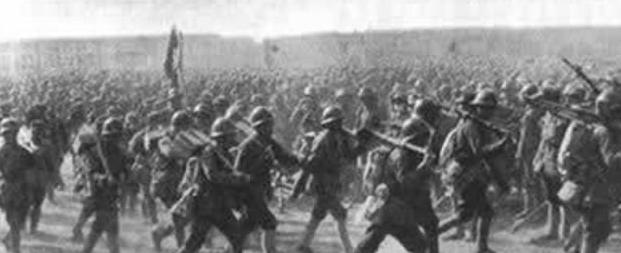A person who does not understand his own history before birth is always a child. - Cicero
During the civil war, the three big men who held this key position were Bai Chongxi, He Yingqin and Yan Xishan. When it comes to military power, the minister of defense is close to the top. However, in the power structure of the national army at that time, there was a position that was more important than the minister of defense, that is, the "chief of staff". Similar to the minister of defense, after the beginning of the war in 1946, the post of chief of staff was also held by the absolute big man in the Kuomintang, but after the end of the war, only two people in total had been involved. Which two are they?

In June 1946, the Nationalist Army initially established the post of Chief of Staff, which must be held by a first-class general and a prominent figure from the Central Army. It has to start with the setting of the position itself. In fact, with the secretary of defense, it is reasonable to say that there will not be a position with similar functions or even more substantial powers than the defense minister. But the first defense minister of the national army is more of a product of balancing factional needs, and look at who became defense minister in 46 years? That's right, it's Bai Chongxi, a big guy in Guangxi. At this time, it was necessary to establish another central general to limit Bai's military power. As a result, General Chen Cheng did not give in and became the first chief of staff during the civil war.
Although Bai was named defense minister in Nanjing, he could only sign some unimportant documents, and he had to exchange views with the chief of staff on major matters and jointly ask the supreme commander. And because Chen Cheng was the core of the civil engineering department, the largest faction of the Nationalist Army, and had the title of "chief of staff", in fact, in 46-47 years, he had a considerable right to speak about the mobilization of national troops and the appointment of generals, at least above the defense minister. The question is, Chen Cheng was transferred to the northeast in the second half of 1947, but why did he maintain the title of chief of staff until May 1948? It turned out that in 47 years, Chen Cheng commanded the troops in Shandong and suffered a disastrous defeat (he was not very good at battlefield command), and he wanted to go to the northeast with the most elite to save face, so he took the initiative to apply for this opportunity, but refused to give up the original title of "chief", so he managed to retain his position. If it had not been for the heavy blows in the northeast and the discredit of the ground, I am afraid that the chief of staff would not have had the next successor in 48 years. Next, we will talk about the second chief of staff of the Nationalist army during the Civil War.
In May 1948, after Chen Cheng, another absolute leader of the Central Army, Gu Zhu, a first-class general in the Army, took the same position. Gu was instrumental in the Xi'an Incident in 36 years, and won the trust of the high-level, at the same time he was also an old man of the Central Army, he was already the commander-in-chief of the army before he took office in 48 years, and when Xuzhou's direct subordinate troops were the most, more than 1.02 million people, which can not be said to be a weak force. However, to tell the truth, Gu could not command so many factions responsible for the troops, and his true status could not be compared with Chen Cheng. A senior general of the Nationalist army, his position is unstable, in the final analysis, he relies on his own concubine troops, which no one in the central military system can surpass Chen Cheng, nor can Hu Zongnan. Gu had served in the army for many years and also had his own independent network of factions, but daoxing was too far behind Chen Cheng.com. Because of this, chen dispatched soldiers basically not many people listened, and the national army saw each other dead and did not save, which was also the most obvious during his tenure as commander-in-chief. After the defeat of the Nationalist army in Taiwan in 1949, the post of chief of staff began to rotate like a marquee, and the gold content was not as good as before.